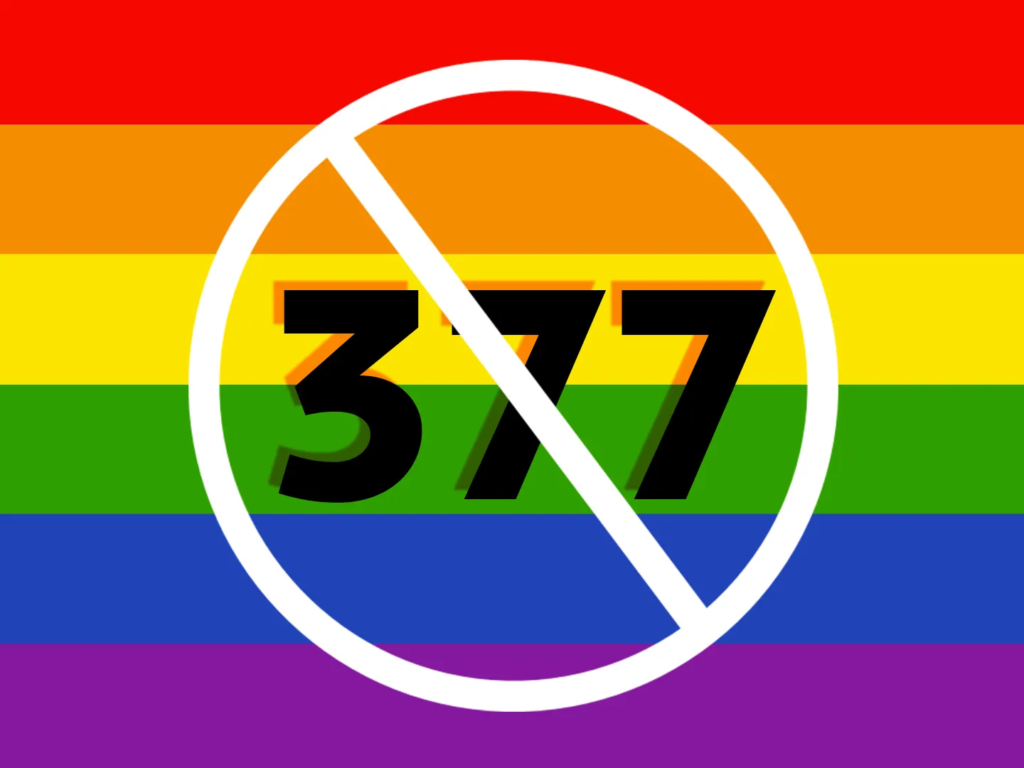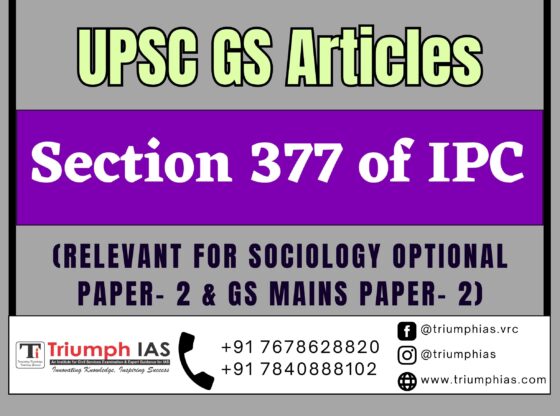Section 377 of IPC
Relevant for sociology optional Paper- 2 & GS Mains Paper- 2

Section 377 of the Indian Penal Code (IPC) is a contentious issue that has been the subject of much debate in India for decades. The section, which criminalizes “unnatural” sexual acts, has been a source of controversy and discrimination against the LGBTQ+ community in India. This provision of the IPC has been challenged numerous times in court, with various judgments passed over the years. In this essay, we will explore the history of Section 377 of the IPC, its impact on the LGBTQ+ community, and the changes brought about by recent legal developments.
The origin of Section 377 of the IPC can be traced back to the British colonial era. The law was introduced in 1860 and was meant to regulate sexual conduct in India. The provision criminalized “carnal intercourse against the order of nature,” which included acts such as anal and oral sex. The law was based on the Victorian-era values of morality and decency and was meant to uphold the traditional notions of family and sexuality.
Over the years, the law has been used to persecute and discriminate against the LGBTQ+ community in India. People who engage in same-sex relationships have been prosecuted and imprisoned under the law, and have suffered discrimination and violence at the hands of society. The law has been a source of stigma and shame for LGBTQ+ individuals, who have been forced to live in the closet to avoid persecution.
In recent years, there has been a growing awareness and acceptance of the LGBTQ+ community in India. This has been reflected in the legal and social changes that have taken place in the country. In 2009, the Delhi High Court decriminalized consensual homosexual acts, declaring Section 377 of the IPC unconstitutional. The judgment was a landmark victory for the LGBTQ+ community, and was seen as a major step towards equality and acceptance in Indian society.
However, the judgment was short-lived, as it was overturned by the Supreme Court in 2013. The court held that Section 377 of the IPC was constitutional, and that it was up to the Parliament to repeal or amend the law. The decision was met with widespread criticism and condemnation, with many people arguing that it was a setback for human rights and equality in India.
The LGBTQ+ community and their allies continued to fight for their rights, and in 2018, the Supreme Court of India finally overturned its earlier decision and decriminalized homosexual acts. The judgment was hailed as a historic victory for the LGBTQ+ community, and was seen as a major step towards a more inclusive and tolerant society in India. The court declared that sexual orientation was an integral part of an individual’s identity, and that discrimination on the basis of sexual orientation was a violation of fundamental rights.
The decriminalization of Section 377 of the IPC was a significant step towards equality and justice for the LGBTQ+ community in India. However, there is still a long way to go in terms of achieving full acceptance and equality for this marginalized group. Discrimination and stigma continue to be major issues, and there is a need for greater awareness and education about LGBTQ+ issues in Indian society.
In conclusion, Section 377 of the IPC has been a source of controversy and discrimination against the LGBTQ+ community in India. The provision criminalized “unnatural” sexual acts and was used to persecute and discriminate against people who engage in same-sex relationships. However, recent legal developments have brought about significant changes in Indian society, with the decriminalization of Section 377 being a major victory for the LGBTQ+ community. While there is still a long way to go in terms of achieving full acceptance and equality, the decriminalization of homosexuality is a step in the right direction and a cause for celebration.
For more such free UPSC notes, Articles, News & Views Join our Telegram Channel. https://t.me/triumphias
Click the link below to see the details about the UPSC – Civils courses offered by Triumph IAS. https://triumphias.com/pages-all-courses.php


